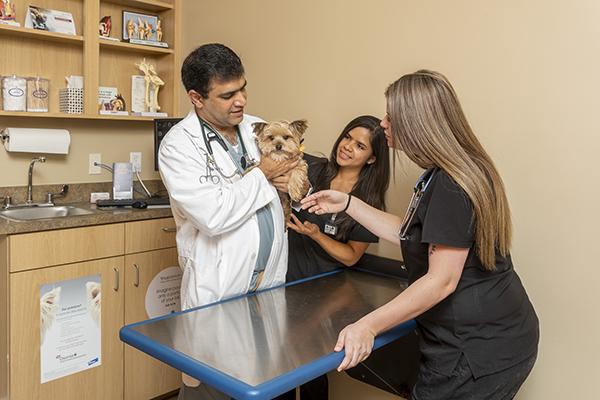Dogs love sneaking human food left out from their owners. They may be found sniffing around the pantry or even jumping on tables to steal a treat for themselves. If you have chocolate sitting around your house unattended, it’s possible that your dog may try to take some for themselves. However, chocolate can be extremely toxic for dogs. If you notice your dog has eaten chocolate, learn what action steps to take and why chocolate shouldn’t be consumed by dogs.
Why Should Your Dog Avoid Chocolate?
All chocolate products or cacao-based products have a toxic compound called theobromine. While this compound isn’t toxic to humans, it can negatively affect the respiratory and nervous systems of dogs. When dogs consume the theobromine compound, they aren’t able to fully process it and it can cause convulsions.
What Amount of Chocolate Is Bad for Dogs?
The higher amount of chocolate a dog consumes, the more dangerous it is. The amount that will make a dog sick, however, depends on the content of theobromine available in the chocolate product. If a dog consumes darker chocolate, then there is likely a higher amount of theobromine. Even just 20mg of theobromine can be unsafe for dogs.
What Kinds of Chocolate Make Your Dog Sick?
All kinds of cacao products can make a dog ill. The most severe kinds of chocolate a dog can eat are dark chocolate, cacao powder or cacao nibs, semi-sweet chocolate, or unsweetened chocolate.
Signs and Symptoms Your Dog Is Sick From Chocolate
If your dog has consumed chocolate, keep an eye out for these common symptoms that they may have become ill:
- Rapid Heartbeat
- Increased Thirst
- Diarrhea
Follow This Advice if Your Dog Eats Chocolate
Learn about what you should do if you found out your dog consumed chocolate.

#1
Contact a Vet
If your dog is becoming ill after eating chocolate, contact your local vet immediately for individualized care. A vet can walk you through the proper at-home protocol, or they may recommend that your dog come to a treatment facility for further evaluation. Speaking to a qualified professional will get your questions answered and your concerns addressed as soon as possible.
#2
Take Account of How Much Chocolate Was Consumed
The amount of chocolate or the amount of theobromine that is consumed by your dog will help you and your vet understand how big of an emergency each situation may be. If you were able to catch your dog quickly after eating just a small bite, there may be no treatment necessary. However, if you see that a large quantity was consumed you will want to take note of that and convey that information to a veterinarian professional.
#3
Follow a Vet’s Recommended Treatment
Some follow-up treatment may be needed if your dog consumes chocolate. It’s important that you follow their recommendations to save your animal and prevent any possible complications.
What Are Common Chocolate Consumption Treatments?
The most common treatments a vet may follow after chocolate consumption include induced vomiting, administering activated charcoal, and giving a dog some antiacids. The treatment that will be best for your dog depends on the size of the dog, how long ago they consumed chocolate, the type of chocolate consumed, and the amount.
#4
Find Ways to Prevent Future Chocolate Access
Once you’ve determined with a vet the proper treatment for your dog, you’ll want to assess the root cause of the incident. Perhaps a chocolate cake from a birthday party was left out unattended, or maybe your goodie cabinet was left open. Whatever the case, try to make it harder for your dog to access chocolate in the first place.
Are There Longterm Effects If My Dog Eats Chocolate?
Some dogs may have recurring digestive problems after consuming chocolate. Others may have permanent nerve damage from the consumption of too much theobromine. However, many dogs are able to make a safe recovery if they follow a veterinarian’s recommendations for treatment.

